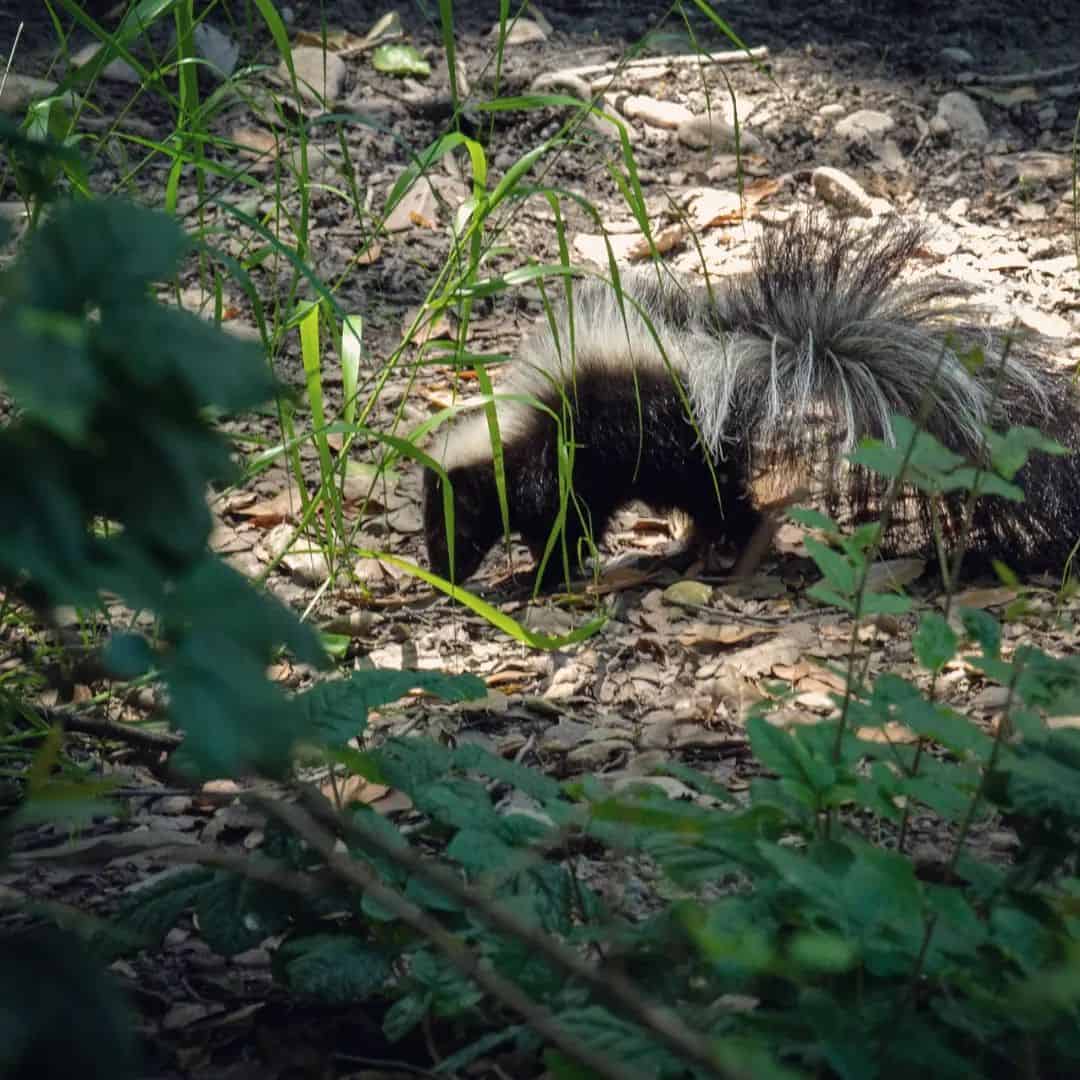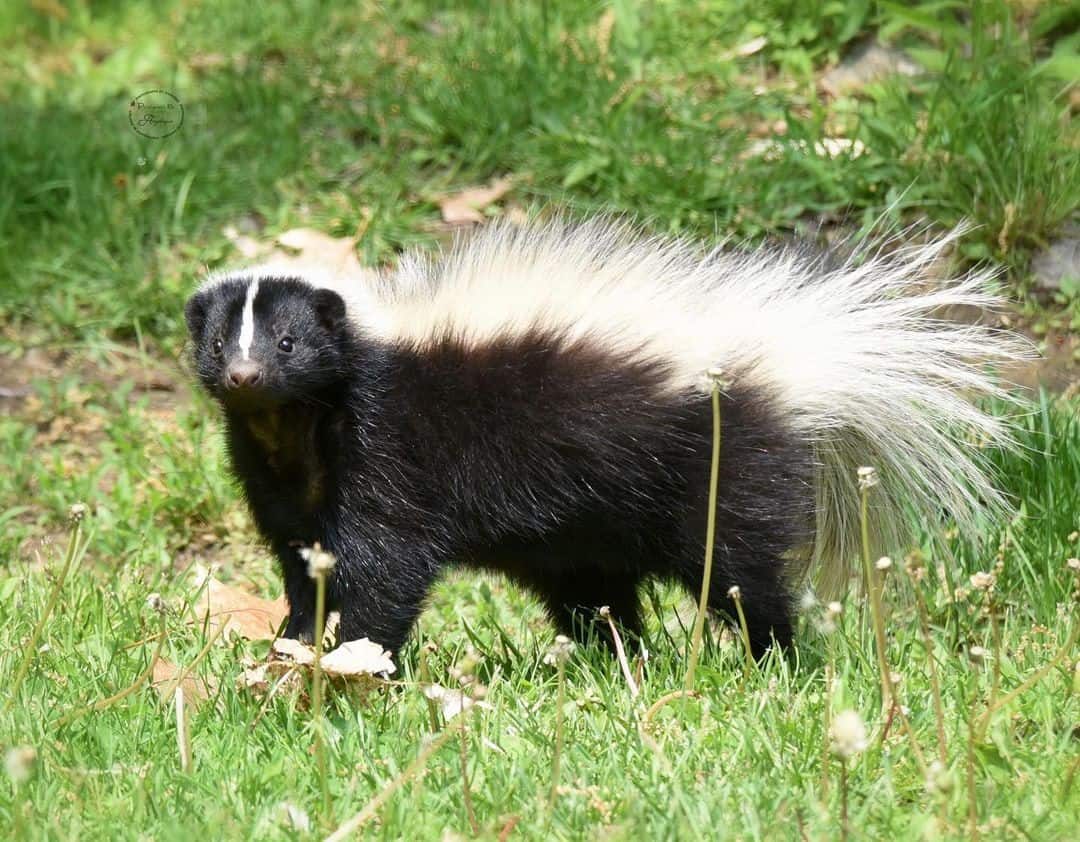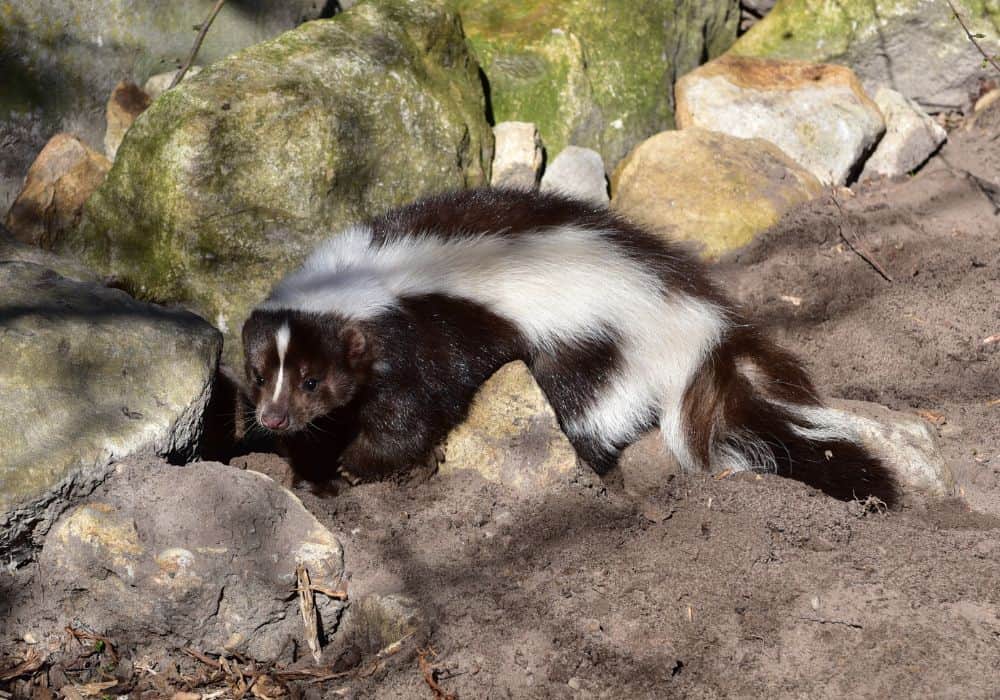Does your backyard emit a distinctive, offensive smell similar to rotten eggs? You may not be wrong if you suspect you’re dealing with a Skunk. Although this omnivore is relatively small and quite cute, it is known to emit one of the most offensive odors you’ll come across. So, what does it mean when you smell a Skunk at night?
Smelling a Skunk at night could mean one of three things: a Skunk is passing by, a Skunk has made its home in your yard, or a Skunk living nearby is trying to warn off predators (larger animals, you included).
Whichever the case, the Skunk odor lingering around your house doesn’t sound inviting, and that’s why this article will explain why these little creatures are stinking up your yard and how to remedy it.
Why Do You Smell Skunk at Night?
Skunks are nocturnal creatures. They move around at night and sleep during the day to avoid encounters with as many predators as possible. So, while you may find it weird that you only smell Skunks at night, that’s just a typical “day” for them, not to mention that they are more likely to spray at night.
A lot of the time, you’ll smell a Skunk before you see it, and since the strength of the odor usually determines how close the skunk is when you can smell a Skunk at night, it is possible it has come in close contact with larger animals and feels threatened.
Because of its size, a Skunk will try to ward predators off the only way it knows how; by spraying.
In light of this, you must be aware that Skunks do not only spray when they see other animals; they sometimes spray themselves. One situation when this happens is if a male skunk is trying to get the attention of an uninterested female Skunk for mating purposes, it may get Skunked as a warning to back off.
How to Determine if a Skunk is Living in Your Yard?
As we mentioned earlier, smelling a Skunk at night only sometimes indicates that a Skunk is living in your backyard. Often, it may be that a Skunk is passing by, or it could be residual spray from a nearby spraying incident.
To be on the safe side, it is best to be sure. Here are a few telltales that’ll help you decipher whether you have a little backyard visitor.
1. Holes
The presence of Skunks could be the reason why you find small, shallow holes and burrows in your backyard. Although these holes are similar to the type dug by squirrels, unlike holes dug by squirrels which are usually large and irregular, skunk holes tend to be small and circular.
In addition, you could also find these holes close to the structure of your house, especially around your porch or foundation. You must know that skunks will try to dig holes as close to your home as possible to take advantage of any cracks or gaps in your house structure.
2. Faint Pungent Odors
A lingering musty smell similar to rotten eggs in the air around your home could indicate the presence of Skunks. This is because even when these animals do not spray, they still carry that faint but recognizable odor. If this odor persists, you may have a Skunk to deal with.
It is also possible a Skunk may have died under your porch. In that case, it is best to find the source of the smell as quickly as possible. The last thing you want is the smell of decay mixing with the smell of skunk. The dead Skunk odor will get stronger, making it unbearable.
3. Spilled Garbage
One of the things that may attract Skunks to your yard is garbage. So, if you come outside to see that your garbage cans have been ransacked and knocked over repeatedly, a Skunk might be the culprit.
Skunks are also clumsy animals and will knock over a couple of other things in your backyard on their quest to find food; Flower pots, pet food containers, and whatever else you may have lying around your yard.
4. Footprints
This is the most obvious telltale sign Skunks will leave behind to announce their presence. The footprint of a skunk will have five toes just like a cat’s; however, a Skunk’s prints will be a little larger.
How to Get Rid of Skunks?

Image Credit: m_w_schmidt
To get rid of the Skunk odor, you must first get rid of the skunk. However, you must be careful with this, as you might get sprayed if the skunk feels attacked. Here are some easy ways to chase your little unwanted visitors away without actually hurting them;
1. Get Bright Lights
Skunks prefer to avoid bright and invasive lights. After all, they are nocturnal creatures, so if you suspect you have an unwanted Skunk around your property, you can install bright flood lights or motion sensor lights in your yard. This way, when a skunk tries poking around in your yard, the bright lights will make the skunk feel unwelcomed.
2. Use Strong Scents
These omnivorous mammals dislike strong scents. As such, you can make your yard uncomfortable for them by using a lot of strong-smelling soaps and disinfectants when cleaning.
The cleaner your yard is, the more difficult it’ll be for a Skunk to make its home there. Keeping a tidy yard includes keeping your garbage cans sealed, keeping your pet food closed, and sealing up any gaps in your house structure.
3. Purchase a Skunk Repellent

Image Credit: _photographybyangelique_
Another remedy to ridding your home and yard of Skunks is using store-bought chemical repellents to chase Skunks away or making natural repellents at home. If you opt for store-bought repellants, ensure they are plant and pet friendly. It is best to pick Skunk repellents that are safe for use around children or pets.
If you want to make a natural repellent at home, here’s a simple recipe you can follow:
- Chop one large yellow onion and one jalapeno pepper.
- Boil the chopped onion and jalapeno pepper with a mixture of cayenne pepper for 20 minutes in two quarts of water.
- Strain the broth and allow it to cool.
- Pour the liquid into a spray bottle, and your natural Skunk repellent is ready.
- Spray this mixture around all the areas you suspect a Skunk may have visited. It should be strong enough to keep Skunks away.
Here are some other scents Skunks detest:
- Black pepper
- Peppermint oil
- Predator urine (cat’s urine, dog urine, e.t.c)
- Chili pepper
- Lavender
- Ammonia
- Coffee grounds
- Black pepper
After spraying Skunk repellent around your yard, the next step is to get the smell off everything and everyone that and everyone that has come in contact with the Skunk spray. This includes your pets. Here’s a simple remedy that is effective for cats, dogs, and humans.
- In a clean bottle, mix the following ingredients: 3% hydrogen peroxide (One quart), ¼ baking soda, and One teaspoon of liquid dishwashing soap.
- Using protective gloves, make sure you mix to achieve a smooth consistency.
- Rub the mixture all over the affected animal or person.
- Let it sit for a few minutes.
- Thoroughly rinse off.
Avoid leaving the mixture on your pets longer than necessary when using this remedy, as hydrogen peroxide can bleach fur. Additionally, do not prepare this mixture beforehand, as it could explode if left to sit in high temperatures for too long.
4. Call for Professional Help
If, after adopting the remedies above and you still can’t get rid of that nasty Skunk smell, the best option is to engage the services of professionals. Your local wildlife control can get the Skunks out of your yard and into safety without hassle.
Is the Spray from a Skunk Harmful?
The spray a skunk emits technically isn’t a spray. It’s a highly volatile oil that quickly evaporates on exposure to air and turns into a gas. This spray is not poisonous to cats, dogs, and humans. However, if you take a direct hit to your eyes, it may cause temporary blindness.
In addition to this, the spray from a Skunk can also be nauseating due to its acrid nature. It may make you teary-eyed, and you’ll need a minute to catch your breath. Skunk spray is made of thiols, sulfur-based organic compounds that smell like rotten eggs but are relatively harmless.
Conclusion
Remember, if a skunk has sprayed you, a simple mixture of hydrogen peroxide, baking soda, and liquid dishwashing soap will do the trick. Popular belief indicates that tomato juice works as well. It may help, but it will only reduce the Skunk odor and not eradicate it. Finally, try out the outlined remedy to that pungent skunk smell and leave your feedback.
